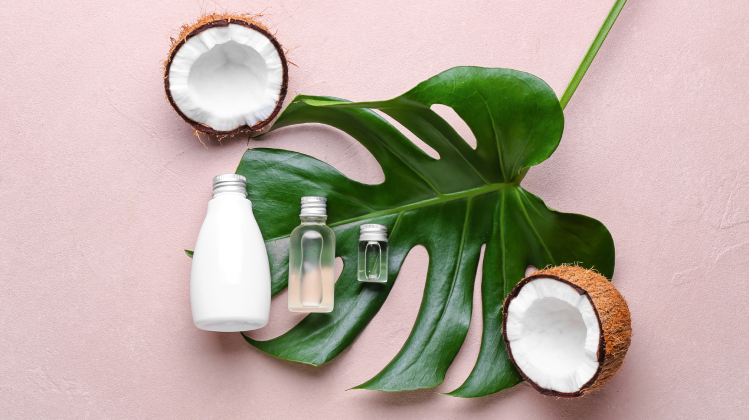
Unleashing the potential of your hair can be a daunting task, especially when bombarded with an overwhelming amount of hair care products on the market. However, nature has gifted us with one of the most potent hair care ingredients: carrier oils.
These elixirs derived from plant-based sources like seeds, nuts, and fruits can be the unsung heroes in your hair care regimen. Not only do they help dilute essential oils for safe topical use, but they also contain unique properties and benefits of their own. Carrier oils are rich in nutrients and fatty acids(1) that promote hair growth, thickness, and overall health.
In this article, we dive deeper into the world of carrier oils and explore the best carrier oils for various hair types, including those prone to hair loss and regrowth.
Which Are The Best Carrier Oils for Hair Growth and Thickness?
Choosing the right carrier oil for your hair type can make all the difference when it comes to promoting hair growth and thickness. Below are our picks for the 10 best carrier oils to help you do just that.
Coconut Oil

Coconut oil has been a favorite among hair enthusiasts for years. It is an excellent carrier oil for promoting hair growth and thickness due to its rich content of lauric acid, which has antimicrobial properties that help maintain a healthy scalp. The high levels of medium-chain fatty acids in coconut oil nourish and strengthen the hair while penetrating the hair shaft, making it an ideal choice for preventing breakage.
Argan Oil

Argan oil(2), also known as "liquid gold," is rich in essential fatty acids and vitamin E, which help to moisturize and nourish the hair, leading to increased growth and thickness. Its antioxidant properties protect the hair from damage caused by environmental factors such as UV rays and pollution.
Pumpkin Seed Oil

Pumpkin seed oil is another excellent carrier oil, rich in nutrients that promote hair growth and prevent hair loss. It contains zinc, which helps to balance hormones, as well as vitamins A, E, and K, which encourage hair growth and strength.
Jojoba Oil

Jojoba oil is an excellent choice for maintaining a healthy scalp and promoting hair growth. It helps to balance the scalp's oil production, preventing excess sebum buildup, while providing deep hydration to the hair shaft. Jojoba oil is similar in structure to our scalp's natural oils, making it a good option for regulating oil production.
Olive Oil

A kitchen staple that also doubles as a beauty treatment, olive oil is another popular choice for promoting hair growth and thickness. It is rich in antioxidants and nutrients that help to protect hair from damage and promote overall hair health. Olive oil's ability to condition and strengthen the hair makes it an ideal option for preventing breakage and encouraging growth.
Grapeseed Oil

Lightweight and easily absorbed, grapeseed oil is an excellent choice for nourishing the hair and promoting growth. Its high levels of linoleic acid help to nourish the hair and prevent breakage, making it an excellent choice for all hair types. Grapeseed oil's gentle formula also makes it an ideal option for those with sensitive skin.
Baobab Oil

Baobab oil is a great carrier oil for low-porosity hair due to its light consistency and quick absorption. It's a powerful moisturizer that helps to nourish and protect hair without weighing it down. Baobab oil's unique blend of vitamins and minerals also helps to promote hair growth, strength, and overall hair health.
Avocado Oil

Full of vitamins A, D, and E, as well as essential fatty acids, avocado oil is a great option for moisturizing and strengthening hair. Its high oleic acid content helps to improve the hair's elasticity and prevent breakage, while its natural shine-enhancing properties leave hair looking shiny and healthy.
Black Seed Oil

Black seed oil(3) has been found to promote hair growth and prevent hair loss due to its high levels of thymoquinone. It also contains antioxidants and anti-inflammatory compounds that help to protect the hair and scalp from damage and inflammation. With regular use, black seed oil can help to promote hair growth and improve overall hair health.
Castor Oil

Castor oil is a thick, viscous oil that is high in ricinoleic acid, which has anti-inflammatory and antimicrobial properties. It is a popular choice for promoting hair growth and thickness due to its ability to improve blood circulation to the scalp and nourish the hair follicles.
Benefits Of Using Carrier Oils for Hair
Let's dive into some of the benefits of using carrier oils for your hair.
Promote Hair Growth and Thickness
Healthy, luscious locks don't just happen overnight. It takes effort, dedication, and the right hair care products. Like carrier oils. These magical elixirs are packed with nutrients and fatty acids that help nourish and strengthen hair follicles, promoting healthy growth and increasing thickness(4).
Known for their ability to stimulate the scalp and improve blood flow, these oils ensure that your hair follicles receive the nutrients and oxygen they need for optimal growth.
Strengthen and Condition Hair
Imagine running your fingers through your hair and feeling strands that are smooth, strong, and full of life. Achieving such hair goals might seem like a distant dream, but with carrier oils, it can be a reality. These natural elixirs are loaded with proteins, vitamins, and essential fatty acids that penetrate deep into the hair shaft, repairing damage and nourishing your strands from within.
Take argan oil, for instance, which is a rich source of vitamin E and antioxidants that help moisturize and restore the hair's natural shine. With regular use, these carrier oils can help you achieve hair that's not just stronger and more resilient but also more beautiful and full of vitality.

Protect Hair From Environmental Damage
Our hair is exposed to various environmental factors like pollution, harsh sunlight, humidity, and dust, which can make it dull, dry, and lifeless. Carrier oils like grapeseed oil form a protective barrier around the hair shaft, shielding it from harmful UV rays, environmental pollutants, and oxidative stress. These oils are rich in antioxidants that protect hair from free radical damage and keep it healthy and strong.
Balance Scalp's Oil Production
If your scalp is producing too much or too little sebum, it can lead to various hair problems like dandruff, scalp irritation, and hair fall. Carrier oils like jojoba oil closely resemble the natural oils produced by our scalp, which makes them an excellent option for regulating sebum production and maintaining a healthy balance. These oils provide deep hydration to the scalp without leaving it greasy, keeping your hair soft, shiny, and nourished.
Improve Blood Circulation
Healthy hair growth depends on good blood circulation to the hair follicles, which supplies them with the necessary nutrients and oxygen for optimal growth. Carrier oils like rosemary and castor oil have been found to stimulate blood circulation in the scalp, which ensures that hair follicles receive adequate nutrients and oxygen for healthy growth. These oils can help reduce hair fall, promote hair growth, and improve overall hair health.
Provide Essential Nutrients
Carrier oils are packed with essential vitamins, minerals, and fatty acids that nourish and moisturize the hair, making it healthy and strong. Sweet almond oil, for instance, is rich in vitamins A, B, and E, which promote hair growth and add shine. These oils provide deep hydration to the hair, improving its texture, elasticity, and overall health. They also help prevent split ends, breakage, and frizz, making your hair look and feel its best.
Ways to Use Carrier Oils for Hair Growth
Ready to incorporate carrier oils into your hair care routine? There are so many ways you can use them to promote hair growth and thickness, from creating an overnight hair mask to using them as a detangler. Here are some of the most effective ways to use carrier oils for your hair.

Overnight Hair Mask for Deep Nourishment
- Mix your chosen carrier oil with a few drops of essential oil in a small bowl.
- Apply the mixture to your hair from roots to tips, ensuring that your hair is fully covered.
- Use about 12 drops of essential oil per 1 ounce (30 mL) of carrier oil to maintain a 2% dilution for hair care.
- Cover your hair with a shower cap and leave the mask on overnight.
- In the morning, wash your hair as usual to remove the mask and reveal deeply nourished and healthy hair.
Hot Oil Treatment for Intense Conditioning
- Warm up your chosen carrier oil by placing it in a bowl of hot water or microwaving it for a few seconds.
- Apply the oil to your hair, focusing on the scalp and hair shaft.
- Massage the oil into your scalp and hair for a few minutes.
- Wrap your hair in a warm towel and let the oil penetrate for 20-30 minutes.
- Wash your hair as usual to remove the oil and reveal improved hair elasticity and reduced breakage.
Create Your Own Hair Serum for Frizz Control
- Choose your favorite carrier oil and add a few drops of essential oils, such as lavender or chamomile, to a small bottle.
- Mix the oils together by shaking the bottle gently.
- Apply a small amount of the hair serum to your hair, focusing on the ends, to tame flyaways and add shine.
Use as Detangler for Easier Combing
- Apply a small amount of carrier oil to your hair before combing or brushing.
- Start from the ends of your hair and work your way up to the roots, using a wide-tooth comb or your fingers to gently detangle your hair.
- Style your hair as desired.
Final Thought
So there you have it! Carrier oils can be your secret weapon in achieving the luscious, thick, and healthy hair you've always dreamed of. With options to cater to different hair types, including low-porosity hair and those dealing with hair loss and regrowth, you can customize your hair care routine to suit your unique needs.
Don't hesitate to experiment with various carrier oils and essential oil combinations to find your perfect hair care regimen. Give carrier oils a shot, and you might just discover a game-changer for your hair care journey.
References
1. Orchard, A. and van Vuuren, S.F. (2019). Carrier oils in dermatology. Archives of Dermatological Research, {online} 311(9), pp.653–672. Available at: https://pubmed.ncbi.nlm.nih.gov/31321504/.
2. Guillaume, D., & Charrouf, Z. (2011). Argan oil. Alternative Medicine Review, 16(3), 275-276. Available at: https://altmedrev.com/wp-content/uploads/2019/02/v16-3-275.pdf
3. Dinakaran S, Sridhar, S. and Eganathan Palanisami (2016). Chemical composition and antioxidant activities of black seed oil (Nigella sativa L.). {online} ResearchGate. Available at: https://www.researchgate.net/publication/309563297_Chemical_composition_and_antioxidant_activities_of_black_seed_oil_Nigella_sativa_L.
4. Abelan, U.S., de Oliveira, A.C., Cacoci, É.S.P., Martins, T.E.A., Giacon, V.M., Velasco, M.V.R. and Lima, C.R.R. de C. (2021). Potential use of essential oils in cosmetic and dermatological hair products: A review. Journal of Cosmetic Dermatology, {online} 21(4), pp.1407–1418. Available at: https://onlinelibrary.wiley.com/doi/10.1111/jocd.14286.

.jpg)
.jpg)
.jpg)
.jpg)
.jpg)
.jpg)
.jpg)
.jpg)
.jpg)
.jpg)